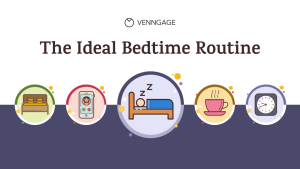Most people who want to improve their health focus on diet, exercise, or vitamin intake. But sleep is a crucial factor that is often overlooked. Good sleep is crucial for overall health, not just for staying refreshed. Good sleep improves your body’s ability to repair and function daily, as well as your mental and emotional well-being. This is something no diet or exercise plan can compensate for. This article explores why adequate sleep is the true key to good health and how it affects every aspect of your life, from your energy levels to your immune system.
The Foundation of Good Physical Health
When you sleep, your body repairs itself. Deep sleep allows your muscles to recover, your organs to heal, and your immune system to strengthen. It’s like a nighttime refresher for your entire body. Without enough rest, your body struggles to recover from the daily wear and tear. This leads to fatigue, inflammation, and a weakened immune system. Chronic sleep deprivation can also lead to serious health problems such as diabetes, heart disease, and obesity. People who regularly get 7-9 hours of good sleep, on the other hand, have a stronger immune system, a faster metabolism, and a healthier heart.
The Importance of Sleep for Mental Health
Sleep is essential for proper brain function. During rest periods, the brain processes information, consolidates memories, and clears toxins that have accumulated during the day. Lack of sleep disrupts this balance, leading to mood swings, difficulty concentrating, and forgetfulness. Over time, sleep deprivation can lead to anxiety and sadness. On the other hand, sufficient deep sleep can make you more emotionally stable, creative, and better at making decisions. It’s no exaggeration to say that adequate sleep is the best natural way to heal the mind.
Hormones and Adequate Sleep
Adequate sleep is crucial because it influences many chemicals that regulate hunger, stress, and growth. Lack of sleep causes the body to produce more ghrelin (a hormone that makes you feel hungry) and less leptin (a hormone that makes you feel full). This imbalance can lead to overeating and weight gain. The stress hormone cortisol rises with sleep deprivation, making you feel tired and irritable, and even developing acne. When you get enough sleep, your hormone levels naturally balance out, helping you maintain a balanced mood, hunger, and metabolism.
How Adequate Sleep Affects Your Energy and Work
It’s clear: Adequate sleep means better productivity. Your awareness and focus directly impact everything you do, whether you’re studying, working, or doing chores. Even one night of sleep deprivation can make it harder to concentrate and make decisions. Chronic sleep deprivation can gradually diminish your creativity and efficiency. Adequate rest is crucial for daily success because it clears your mind, increases your motivation, and speeds up your reactions. When you’re well-rested, you’ll achieve your goals faster and more easily.
The Impact of Sleep on Your Mental Health
Sleep and mood are closely linked. When you’re tired, you can’t effectively manage anxiety or control your reactions. That’s why even minor annoyances can feel unbearable after a sleepless night. The amygdala and prefrontal cortex, areas of the brain responsible for emotions, function better when you get enough sleep. This helps you manage your emotions, become more patient, and feel stronger. People who get enough sleep are generally happier, calmer, and more balanced. This leads to better relationships and an overall sense of well-being.
The Impact of Sleep on the Immune System
Rest is crucial for maintaining a strong immune system. Cytokines are proteins that help the body fight disease and inflammation. They are produced during deep sleep. Lack of sleep can weaken your immune system, making you more susceptible to colds, flu, and other illnesses. Researchers have found that people who sleep less than six hours a night are more likely to get sick after exposure to germs. Rest helps your immune system function better, which keeps you healthy and reduces your risk of disease.
The Connection Between Sleep and Longevity
Getting enough sleep not only makes you feel better, but also helps you live longer. Studies show that regular and sufficient sleep is linked to a longer lifespan and a lower risk of chronic diseases. Adequate sleep can reduce the risk of neurological disorders like Alzheimer’s disease and…
Our bodies need to repair themselves
This happens when energy stores are replenished, muscle tissue heals, and growth hormones are released. When athletes and sports enthusiasts prioritize rest, they typically perform better, recover faster, and suffer fewer injuries. Without enough sleep, your body struggles to recover properly, and your workouts are less effective. If you want to achieve your fitness goals, consider how crucial adequate deep rest is.
The Connection Between Sleep and Healthy Skin
It’s called “beauty sleep” for a reason. When you rest, blood flow to your face increases, which helps repair the damage caused by daily stress and UV rays. Lack of sleep can lead to dull skin, bags under the eyes, and premature aging. On the other hand, enough quality sleep can keep your face firm, your eyes bright, and your skin radiant. It’s one of the most natural and cost-effective ways to maintain a youthful and healthy complexion.
Develop a Better Sleep Schedule
Just knowing that sleep is important for your health isn’t enough; You have to put it into practice. Develop a sleep schedule that helps you rest. Try to wake up and go to bed at the same time every day. Avoid coffee, heavy meals, and screen time before bed. To sleep better, make sure your bedroom is cool, dark, and quiet. These small changes in your life can help your body and mind regain their normal rhythm, which can help you sleep better.
Frequently Asked Questions
1. How many hours of sleep do I really need?
Most people need 7 to 9 hours of good sleep every night, but everyone’s needs vary depending on age, health, and lifestyle.
2. Can I catch up on sleep on the weekends?
While sleeping in occasionally can help, it can’t completely compensate for a lack of sleep on a regular basis. The best results come from getting a good night’s sleep every night.
3. Why do I still feel tired after a good night’s sleep?
Stress, poor sleep quality, or frequent changes in schedule can prevent your body from reaching deep, restful sleep.
4. Does sleep really help you lose weight?
Yes. Sleep influences the production of hunger and stress hormones, which can change how and what you eat. Lack of sleep can cause you to overeat and burn fat more slowly.
5. What are the best natural ways to sleep better?
Develop a relaxing bedtime routine, avoid caffeinated drinks after noon, avoid screens before bed, and make sure your bedroom is a quiet and comfortable place.
In short
True health doesn’t come from strict diets or endless workouts; it starts with enough rest. Sleep is your body’s natural way of repairing itself. It balances all your systems, allowing you to function optimally. Making sleep a priority not only makes you more energetic, but also strengthens your immune system, maintains your mental health, and makes you happier overall. Good sleep isn’t just about rest; it’s the key to long-term health. Make sleep a priority tonight. Your body and mind will thank you in the morning.




